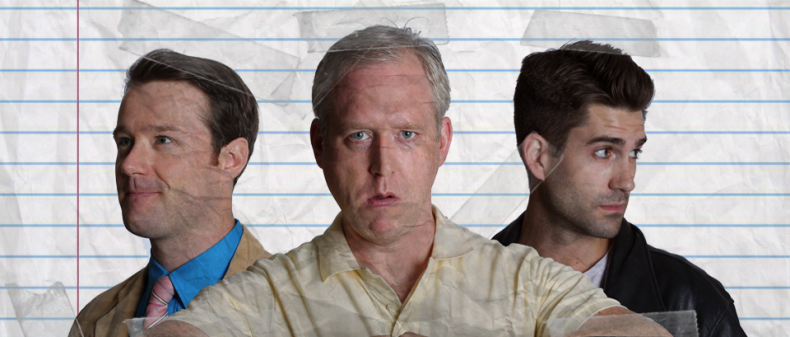
Depending on your perspective, Canada’s greatest television comedy successes of the past fifteen years have looked like failures. While network series with broad appeal like Corner Gas and The Rick Mercer Report have dominated the ratings at home, the shows that have won over fans and critics around the world have been low-budget cable oddities like Trailer Park Boys, Kenny vs. Spenny and The Tom Green Show. But at a time when broadcasters seem reluctant to let talent experiment on the air, it seems likely that the next great Canadian cult classic will emerge on the web.
With a deluge of new media grants and and limited opportunities for young talent to break into the traditional broadcast world, Toronto has become an epicentre of sorts for web series production. A recent round of web series funding from the Independent Production Fund attracted hundreds of applications for 14 coveted spots. To find out more about the web series explosion, Toronto Standard spoke with some of the creative minds behind Guidance, a web-series about “three shitty guidance counselors” that also airs on Bite TV’s digital cable channel. With the second season wrapping up last week (all episodes can be viewed here), director Jared Sales and actor Adam Cawley shared their insights into the do-it-yourself world of web comedy, the future of Canadian media production and the allure of the United States.
On getting a web series:
Adam Cawley: Rob [Baker] and I had done a web series the previous summer called Live from the CenTre. We had been in that environment and we loved it. What a great way to work. Writing a film, it’s nice practice, but unless you have a background in it or enough cred and enough résumé to get that thing sold, nothing’s going to happen with it. We had a logline where every time we told someone that the show is three shitty guidance counselors that ruin kids’ lives, people laughed and said, “This deserves to be made.” So we said, let’s just get it done. It doesn’t require anything, it’s not a fancy show: it’s two people sitting by a desk. And when Jared was like, “I can do that” it was like, let’s do it. Let’s absolutely do it. We were like, we’ll do a web series, we’ll do a TV show, we’ll do one short, anything.
Jared Sales: I took it to my fiancée at the time, now my wife, who worked at Bite and she loved it.
AC: We got a lot for free. We’re both Humber alumni and Humber was very generous with their space, letting us use it. And we assembled a cast of people — like we shouldn’t have been able to — we all did it for free and none of them should be working for free.
JS: We pulled a lot of favours all over the place, even on the production end too.
On distribution strategies in the age of Netflix:
JS: The whole thing has six half hours that air on television and we cut it up into a web series. Instead of having a commercial break where you kind of want to leave the audience on a cliff hanger, we thought maybe we should make each act break a bigger cliff hanger than it would be. We tried to make (the web series episodes) standalone pieces, but to get the full experience you watch the whole narrative.
AC: I was reading this article that said, maybe we need a new word for things like House of Cards and the new season of Arrested Development. It’s TV, but it’s not. I was going to watch an episode and I thought, “I have 22 minutes,” and then I looked at Arrested Development and it was 34 minutes. They’re not following any rules, they don’t need to. I don’t know what that new thing is going to be called.
JS: When we were talking about how we wanted to distribute the show we were looking at how House of Cards put all 13 episodes on Netflix at once. We decided every Monday we’re going to have four new episodes, so it’s not following the exact House of Cards structure, but they’ll get four new episodes a week. If (the audience) wants to sit down and binge watch, they can. Or, if they want to watch it sporadically, they can do that too. I think it’s better to just have more content there for people to get into it.
AC: It’s like a microcosm of YouTube clips. If you click on a link and the video is over five minutes long, no one is going to watch that. But if you can watch a whole bunch of little ones, you will. And the idea of waiting a week until the next episode will drive people insane, they forget about it. And, I’m going to make sure I’m home on Sunday at 7 to watch my show, that doesn’t happen anymore.
On why there are so many web series being made in Canada:
AC: I think that it’s grants, and other than that I think it’s the fact that, coming up in the fall, Global has zero [Canadian produced] comedies in prime time or zero Canadian content or something, so it’s just so hard to see an end goal in that traditional way. If you want to get something made that turns into something larger — like someone like Picnicface, to start they were just on YouTube, that was enough to get to the next step. And so I think it’s honing your chops and then having a product that you can show to someone and say, “Give us more money, we’ll create an even better product.”
JS: There are just very few places that you can go, especially for comedy, in Canada, with television or web series ideas. So I think what you’re seeing a lot of now — and not that these started as web series — but shows like Girls and Louie or even Curb Your Enthusiasm, they all kind of have a singular voice that starts this whole thing that turns into the world around these people. So I think you have a lot of creative people realizing, “I have strong personal voice.” It feels like it’s moving towards a system where people who are creative who have the tools to put something together will just [do it themselves]. I think there’s a lot of freedom in the internet, because it doesn’t have to be as big as a TV show. It’s on a smaller scale, very personal and intimate. I think you’re seeing a lot more web series coming out of Canada because of frustration with the lack of places you can go in the broadcast world.
On the disconnect between old business models and new realities:
JS: It’s like being in a relationship and saying, “Something here has to change but I can’t quite put my finger on it.” (laughs)
I don’t think it’s quite on a CRTC level where the problems are… I used to not be a fan of CanCon but now I think it’s kind of necessary as a rule. Especially as the Internet gets bigger and bigger, I think there is a need for it. Because I think some stuff will get lost. I mean look at music. Look at how many bands break in the US now because of CanCon and people listening to CBC radio.
AC: I think what [the Canadian web series explosion] is breeding is great. There are not a lot of opportunities so, you know what, I’ve got to go do this on my own. We’re creating a culture of people who, wherever they end up, they’re going to be amazing writers, amazing producers, actors, because they’re going to have so much experience. I talked to some older alumni of Second City and they’re curious about how web series work, or how they can get involved, because they haven’t been doing it all their lives, and that’s just all we’ve known. The idea of growing up and getting on TV in Canada, never really seemed like a possibility, so we’ve created a world where you have to be the best at everything. If I want a job, I have to learn to do it myself, and if my first ten suck, my eleventh one is going to be amazing. And there’s a whole culture of people ahead of us — they may be amazing at one thing because they’ve been successful, or had opportunities as a director, writer or actor, but now a whole sub-section of us are getting the best at everything. And I hope in five years there’s going to be this amazing group of talent that a production company or network will just be like, “You ten, here’s money go and do your thing because you have all the talent you need.”
On defining success:
AC: Look at Seinfeld — he doesn’t need anything. What does he want to do? He want’s to make a small little web series with his buddies. And I think that’s all any comedian wants to do, make little projects with their buddies. And the idea of getting enough clout to get money to support your buddies is amazing. When we filmed Guidance, we hired a bunch of other Second City people and we thought, “This is amazing, we’re paying all of you and we’re just hanging out.” I think that’s always going to be the goal no matter how successful you are. So whatever medium it turns out to be, it’s just about getting better at that so we’re able to continue to do that, so you don’t have to get that other job or support yourself other ways. To support ourselves with what we want to do with our friends, I think that’s the goal for everybody.
JS: When I first started to do standup or just making films I did it because I thought it was fun, and then it turned into, “Oh shit, I think I could actually make a go at this.” So then it became, “How do I get better?” If anything, it’s lack of ego that drives me, because I don’t know where my next pay cheque is going to come from. You kind of have to have that attitude. I think that’s where web series and all the grants and stuff are great. It takes a comedian, who may not necessarily be the most organized and outgoing when it comes to that, and you have to be a hustler.
On entertainment industry inspirations:
JS: I look at a guy like Louis CK, a guy who is amazing and is talented across the board. He had years of rejection with TV shows and he went to FX and was like, “You don’t have to pay me very much money, I just want to do what I want to do and you guys put it on TV and is that cool?” And they were like, “Cool.” I love that DIY attitude. Growing up I used to play in bands and play punk shows all the time and it was that do it yourself thing. If I’m going to sit around in Canada and wait for the phone to ring, I’m going to be sitting around for a fucking long time. Forever, and probably it never will ring.
AC: I love the idea of what Ricky Gervais does. “I’m going to do The Office for three seasons and I’m done.” Six episodes for three seasons, done. And Extras: two season, I’m done. And they idea that, “I have other ideas I’m not going to bleed this thing dry.” Little projects with different friends and different groups of people, let’s come together, let’s do this thing. I know I keep harping on this but the whole Judd Apatow, Seth Rogen group. This Is The End, I fucking loved. Everyone got paid so little, it was just like, “I just want to make a movie with my buddies.” And it’s great. It’s really funny. And everybody’s just hanging out doing their thing.
On the allure of working in the United States:
AC: Yeah, I think going to the states is definitely on my mind. I think right now amassing a lot of things to bring down there is the goal right now. I created this, I created this and I created this… I can do this. Like I said, being good at everything, and whatever the job you have, I can do that. Then working from the start again out there and amassing projects and then, “Great I’m bringing my buddies down”
JS: I’m a dual citizen I could have gone a long time ago. I was born there. But I like it here. I mean if the phone rang tomorrow and there was a huge opportunity for me to go down, would I say no? absolutely not I’d go in a heartbeat. But there’s something about Canada that I love. I don’t know, it’s not forefront on my, it’s not my end game. I just want to do what I want to do. And it’s getting to the point where the internet is kind of breaking down that barrier of where you are geographically in the world and just letting you kind of do your thing.
This interview has been condensed and edited. You can watch all the episodes of Guidance here.
____
Michael Kolberg is The Sprawl Editor at Toronto Standard. Follow him on Twitter for jokes @mikeykolberg.
For more, follow us on Twitter at @torontostandard and subscribe to our Newsletter.














